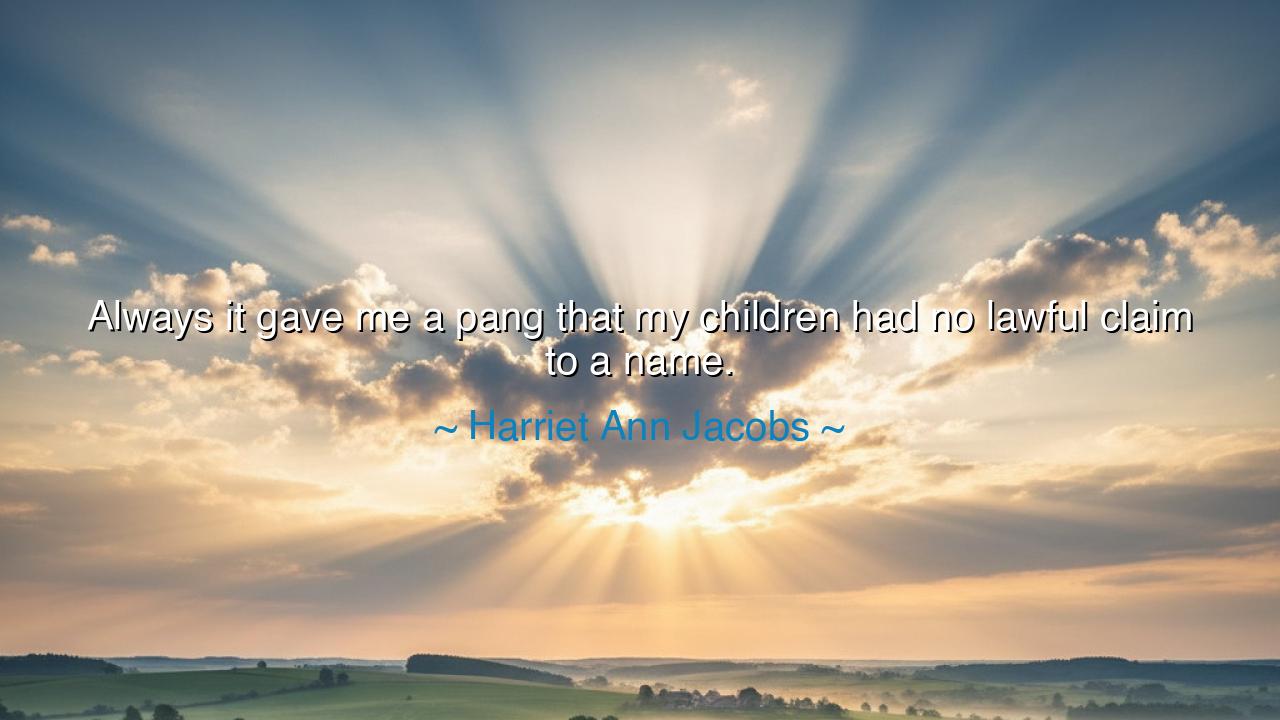
Always it gave me a pang that my children had no lawful claim to






The words of Harriet Ann Jacobs — “Always it gave me a pang that my children had no lawful claim to a name.” — strike with the solemn weight of injustice and the tender ache of maternal love. Beneath their measured phrasing lies the eternal lament of those whose children are denied recognition, whose very existence is bound by systems of oppression. To a mother, a name is not merely a word; it is a declaration of identity, of belonging, of legitimacy in the eyes of the world. For Jacobs, the pang she felt was the profound sorrow that her children, though born of her blood and spirit, could not claim the dignity of that recognition.
In speaking of “no lawful claim to a name,” Jacobs exposes the cruel machinery of slavery that denied humanity itself. Names, in the societies of old and the new, are not trivial; they are the first gift a parent gives, the first anchor in the tumultuous sea of life. To be nameless, or to have one’s name denied legal or moral weight, is to live in a liminal shadow — present in flesh but invisible in law, recognized in heart but unacknowledged in society. This anguish of a mother, who knows the depth of her children’s worth yet sees the world refuse it, is a pang that reverberates across centuries, echoing the cries of countless parents caught in chains of cruelty.
The ancients understood the power of names. In Egypt, to know the true name of a god or a person was to wield power over them; in Greek and Roman thought, to name was to define essence. To deny a name is to deny existence. Jacobs’ reflection is thus not only historical but philosophical: her children’s legal invisibility mirrors the spiritual invisibility imposed by oppression. Yet her words also carry defiance — the recognition that the moral claim of a mother’s love transcends any law, any statute, any decree. In her heart, her children’s identities were sacred, unyielding to injustice.
Jacobs’ lament recalls the story of Sojourner Truth, another woman born into bondage, whose children were torn from her by the laws of men. Truth would later speak with the fire of moral authority, asserting that her children, though denied legal acknowledgment, were fully human and fully sovereign in the eyes of God. Like Jacobs, she endured the pang of separation and illegitimacy imposed by tyranny, transforming personal sorrow into a weapon of moral clarity. Their experiences reveal the timeless truth that love and justice often exist in tension with law, and that the soul’s recognition of dignity can outlast the failures of human governance.
Yet within the sorrow, Jacobs’ words also illuminate the courage of maternal endurance. To love children whose claim to the world is denied is an act of heroism. Every meal provided, every comfort given, every whispered prayer, is a declaration that they exist, that they are known, that they matter. In this, her pang becomes both lament and strength: it is the emotional crucible in which the resilience of motherhood is forged. To bear this sorrow and still act with unwavering care is to embody the noblest virtues of humanity — protection, devotion, and moral witness.
The historical resonance of her reflection is immense. Throughout the annals of slavery, colonization, and oppression, countless mothers have suffered the same invisible pain. Their children were denied inheritance, denied names, denied the simplest recognition of personhood. Yet these mothers’ love became the silent scaffolding upon which future generations could rise. They taught, by action rather than decree, that identity is not only conferred by law, but asserted by love and remembered by history. Jacobs’ pang is thus both personal and universal, a mirror to the endurance of countless maternal spirits.
From her reflection, a lesson emerges for all generations: to recognize the dignity of every child, and to fight for their rightful place in the world. Naming, acknowledging, and honoring another is not a mere act of ceremony; it is a declaration of justice. To overlook it is to deny humanity itself. Jacobs’ words remind us that while law can fail, moral courage can endure — and that those who stand for their children’s recognition embody a timeless form of heroism.
Thus, Harriet Ann Jacobs’ pang becomes a beacon: a call to witness, to act, and to honor the sacred bond between parent and child. Let us learn that every child deserves a name, a claim, a place in the world — and that when society denies it, it is the courage of the loving heart that restores it. In the pang of a mother’s sorrow, we find both the truth of injustice and the path to enduring justice.






AAdministratorAdministrator
Welcome, honored guests. Please leave a comment, we will respond soon